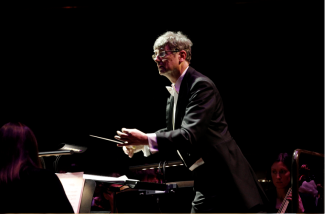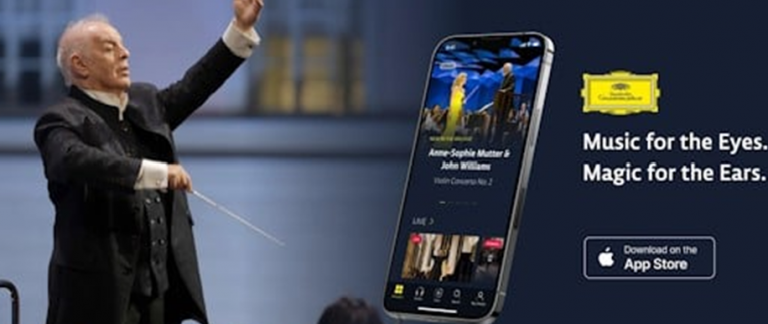Opera’s Quiet Achiever Bids Farewell

Last Saturday night, the Green Room of the Sydney Opera House was buzzing as performers from various companies prepared for the evening’s shows. Shortly before 7.30, the cast of the La traviata company received their call to the stage. Amongst those summonsed was Anthony Legge, Associate Music Director at Opera Australia who has been conducting a run of ‘traviatas’. It was the last time that “Maestro Legge” would be called to the stage of the Joan Sutherland Opera Theatre of the Sydney Opera House. After 8 years as the quietly beating heart of the company’s music programme, Anthony Legge is stepping off his Antipodean rostrum to return to living and working in Britain.
Anthony Legge left his position in London as Director of Opera at Royal Academy Opera in December 2008 to become Assistant Music Director at Opera Australia, second in musical command to then Music Director Richard Hickox. Legge’s arrival in Australia in January 2009 was overshadowed by Hickox’s sudden death from a heart attack in Wales in December 2008. Speaking to SoundsLikeSydney, Legge looks back at those uncertain days. “Adrian Collette who was the CEO of Opera Australia at the time, rang me and asked ‘Are you still coming?’ and I said ‘Of course! I’ve signed the contract so I am still coming’ and he was very relieved.” Interviewed by Matthew Westwood in The Australian in January 2009, Legge was emphatic that given his long association with Hickox, he wanted to follow through with the conductor’s intentions. “I know what he wanted for the company and he believed in it,” Legge said at the time. Legge was to have been “Hickox’s assistant, a maintainer and builder of musical standards.”
Anthony Legge brought with him a world of operatic experience. He read Music at Queen’s College Oxford and went on to study at the Guildhall School of Music and Drama and the London Opera Centre, where he later joined the staff. He studied accompanying with Geoffrey Parsons and Paul Hamburger. His working credentials are a mix of metaphors – both gilt-edged and cast in iron. For fourteen years Legge was Head of Music at the English National Opera; in various roles as pianist, conductor and vocal coach, his work has taken him to Glyndebourne, Amsterdam, Brussels, Gothenberg and the BBC; to Bayreuth for six seasons where he assisted Barenboim in the Kupfer Ring Cycle and Die Meistersinger von Nüremberg. He has made recordings and given recitals with luminaries like Dame Janet Baker, Sir Thomas Allen, Robert Tear and Håkan Hagegård and is in demand as an adjudicator and teacher.
Throughout his time in Australia, Legge has maintained a professional presence in Britain where he has been a Visiting Professor at the Royal Academy of Music, as well as working with the young singers on the Royal Opera’s Jette Parker Young Artist Programme. He was music advisor at Grange Park Opera and has undertaken projects at Gyndebourne Festival Opera, such as the production of The Barber of Seville in 2016. It is to Glyndebourne that he will return when he leaves Australia, to work on the upcoming production of Ariadne auf Naxos.
Juggling his transhemispheric commitments has not been easy, especially as his family is in England and Legge has tried to maximise the time he can spend there. “I’ve been trying to get back as much as I can but it’s expensive going back and forth and it’s a trip that one doesn’t want to do too often. There comes a point when I just don’t want to go on doing that because I’ve been doing it for so many years. I also didn’t want to go on doing administration because I’ve been doing it for so long. I just want to make music.”
Much of Anthony Legge’s work at Opera Australia has been behind the scenes, guiding the singers in the sound they make and helping them understand their roles. However, audiences would have seen him conducting a range of operas from Mozart to Puccini to Prokofiev and he nominates the opportunity to conduct Prokofiev’s The Love for Three Oranges in 2016, as one of the highlights of his time with Opera Australia. Legge says that conducting was not high on his agenda when he arrived. “I wasn’t expecting to do so much conducting because originally I was trying to push as many Australian conductors as I could. But some of them didn’t quite come up to scratch and the good ones left and went to Europe because there is not enough work in this country. So I started to do more conducting. I enjoyed doing the Mozart-McVicar canon, which I conducted in Melbourne; The Love for Three Oranges was fantastic – and Albert Herring; and finally, The Eighth Wonder, which we did on the steps of the opera house and which I never saw because I was in the studio conducting the orchestra. That was a massive thing because we had to do that on a very tight budget and very quickly. It was very hard work but it was fantastic and all the young singers were absolutely brilliant!”
Legge also expresses great pride in the Opera Australia Chorus and the Opera Australia Orchestra “The chorus are fantastic” he enthuses. “They’re nominated in the International Opera Awards which are coming up in a few weeks. I’m really proud of the orchestra. They have a fantastic Concertmaster, they’ve really improved and their morale is fantastic. It is such tough job playing every night in that pit. They’re the hardest working orchestra in the whole of Australia because they play for the ballet as well. I’m very proud that people around the world are beginning to realise what’s happening over here.”
“Another achievement with which I was partly involved and am proud of, was performing The Ring in one go. I talked to Adrian a lot about this. Not one opera each year, which takes 4 years of performing one of the 4 operas each year and in the fifth year making the cycle, by which time you’ve run out of money. That’s what’s happened in a lot of places where they’ve never achieved a cycle. We decided to be really dangerous and do the whole cycle together. It was easier to raise money – all the Wagnerites are absolutely enthusiastic about going to the whole thing so that’s what we did in 2013 which was a Wagner anniversary year anyway and then we repeated it in 2016. It was an enormous success. We were lucky to get international singers to give up that amount of time to sing in Australia. If you’re only in one of the operas like Sieglinde, for example, you’re hanging around in-between your performances, so it’s very hard to pin down international singers for that length of time, but we achieved it and to achieve two Ring cycles like that is more than most opera companies have done.”
When he arrived at Opera Australia, Legge made the critical observation to Adrian Collette that excellent as they were, Opera Australia’s previous Music Directors Simone Young and Richard Hickox had thriving careers in Europe. It was unrealistic to expect a recognised conductor to spend much of the working year in Australia. “You can’t really deal with problems by email all of the time and often they couldn’t catch a problem on the spot because they weren’t there physically and also because they were so busy when they arrived, usually doing two operas at once, they had very little time to sort out the company.”
“I suggested to Adrian that it would be better not to have a Music Director but to have an Artistic Director who would have more time to stay in Australia. So when Lyndon Terracini was appointed Artistic Director, because he wasn’t conducting, he wasn’t directing and he wasn’t singing, he could watch to every performance and stay ahead of the game.”
Is the nature of opera changing with innovations like amplification? Says Legge, “Obviously any outdoor production has to be amplified. Inside the theatre it is a dangerous line to go along because then it becomes musical theatre. Many people don’t realise what a phenomenon it is to hear the opera singers who sing Tosca and La bohème. None of them are miked and they sound fantastic. That is what we have to get across to the public because they’re hearing something that is pretty extraordinary and it could die out because it is just too easy to mike them. You don’t get the power of the voice and the phenomenon of one person standing on that stage sending their voice out and it’s vibrating inside you. You may think you’re hearing it through your ears but in actual fact you hear it vibrating in your body. If you miked a singer you wouldn’t know if it is the speakers conveying the power, or the singer. If that art is lost, that is very dangerous and it is worrying that people have this fear, because they realise how amazing it is to be able to sing like that and it’s so important for the future that opera survives.”
Anthony Legge’s departure leaves a tremendous void in the national opera company. There is no replacement at Director level who has Legge’s global experience, intellect and expansive knowledge. Tahu Matheson who conducted Tosca recently, will be Head of Music. Says Legge, “He is very talented and he may grow into more than that, but he can run the music side because it needs someone to do that.”
Would he return as guest conductor? Unflinchingly he says yes, if asked. “Of course I would because it’s my second home and I’ve been out here for so long since the Joan Sutherland period. My daughter was born here and my mother was born in Perth. So it’s a big thing for me to go, but I felt I had to make that decision because I just couldn’t quite keep going backwards and forwards like that – you lose a day in your life and its expensive.”
Legge’s parting assessment of the performers of Opera Australia is glowing. “The singers and the chorus and the orchestra are an amazing company and they need to be reminded of this sometimes. They don’t know what standard they’re at because they have nothing to compare themselves with. I hope the public will keep on supporting the company because it is something very special for Australia, which has a strong tradition of singing from Nellie Melba onwards. We have to get through to the government a little bit more because they obviously support sport much more than they support the arts. They don’t realise how important this is for the whole world because people are beginning to sit up and notice that this is a great company.”
Shamistha de Soysa for SoundsLikeSydney©





